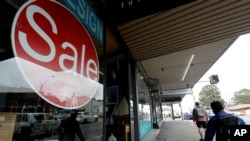Australia’s multi-billion-dollar wage subsidy credited with saving hundreds of thousands of jobs during the COVID-19 pandemic has ended. A cluster of infections has forced the Queensland city of Brisbane into a snap three-day lockdown.
The U.S. $53 billion JobKeeper program was the biggest economic package in Australian history. It guaranteed workers a paycheck even when businesses were forced to close during lockdowns.
In Canberra, the government has said with the recovery underway, it is time for the economy to support itself.
Senior officials have said JobKeeper would be replaced by targeted stimulus programs, the first stage of which will be an expansion of the scheme to pay part of the wages of apprentices.
But critics believe the move is premature, and the end of the wage subsidy scheme will put many jobs in jeopardy.
Leanne Harwood is the managing director for Japan, Australasia & Pacific at IHG (InterContinental Hotels Group) Hotels & Resorts.
She had hoped JobKeeper would be expanded to help the tourism industry.
“Without it we would have had to make a lot more people redundant. Sadly, we would have lost a lot more people and we probably would have had to close a lot more doors of our hotels and right now we have been able to keep most of them open, which has been quite frankly a godsend having that JobKeeper to be able to do that. You know, we have been able to keep people employed, which has made such a difference in so many people’s lives, and I am incredibly worried about what is going to happen when that JobKeeper goes away,” Harwood said.
The pandemic sent Australia into recession for the first time since the 1990s. But there is evidence the economy is rebounding strongly.
Recent figures from the Australian Bureau of Statistics have shown Australia’s jobless rate dropped from 6.6% in December 2020 to 6.4% in January.
Australia has mostly contained the virus, but a small, but growing cluster of infections in Brisbane has forced the authorities to order a three-day lockdown starting Monday, and stay-at-home orders will apply. The Queensland state premier Annastacia Palaszczuk said she was “very concerned.”
However, in neighboring New South Wales more COVID-19 restrictions are being eased on Monday. Singing and dancing is now permitted, allowing nightclubs to reopen. Sports stadiums and theaters can also operate with 100 per cent capacity, and masks are no longer mandatory on public transport.
A nationwide mass vaccination program is also underway.
Australia has recorded just over 29,200 coronavirus cases since the pandemic began. 909 people have died, according to the Health Department.




